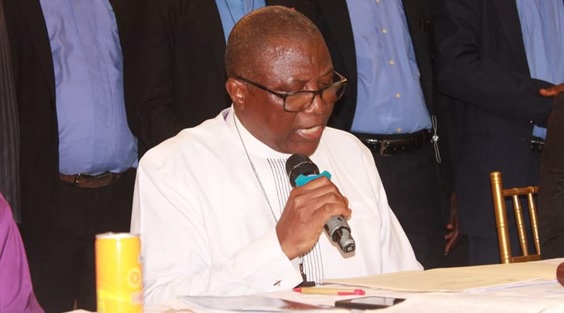MONROVIA – In a decisive statement, Bishop Samuel Quire of the United Methodist Church of Liberia (UMC) reiterated the church’s position against same-sex marriage, declaring, “The United Methodist Church is not a gay church; the church in Liberia will not endorse same-sex marriage.” This statement was made during a press conference on Friday, June 7, at the Perspective of St. Trowen Nagbe United Methodist Church.
Bishop Quire’s address aimed to clarify the church’s stance amidst the ongoing global debate within the United Methodist Church regarding LGBTQ+ inclusion and same-sex marriage. He emphasized that while some regional conferences within the global denomination may have differing views, the Liberian conference remains steadfast in its adherence to traditional Christian doctrines regarding marriage.
“The Liberian conference will not be swayed by external pressures or the changing norms in other parts of the world,” Quire stated. He noted that the United Methodist Church in Liberia is committed to maintaining its theological principles and will not compromise on its belief that marriage is a union between a man and a woman. The bishop acknowledged the complexity and sensitivity of the issue, especially given the varying perspectives within the global United Methodist community. However, he affirmed that the Liberian church’s position is clear and unchanging. “We respect the discussions happening globally, but our church here in Liberia will uphold what we believe to be the biblical definition of marriage,” Quire added.
Bishop Quire also addressed concerns about the influence of different cultural and societal values on the church’s doctrine. He pointed out that while the United Methodist Church is a global denomination, each conference has the autonomy to adhere to its regional context and beliefs. “Our commitment is to our faith and our understanding of the scriptures,” he said.
Key Decisions from the 2024 General Conference
My brothers and sisters of the Liberia Episcopal Area of the United Methodist Church, members of my cabinet, members of the press, my fellow Liberians, it is a joy to be back in Liberia following a historic and momentous General Conference of the United Methodist Church held from April 23 to May 3, 2024, in Inshallah, North Carolina, United States of America. The General Conference is the legislative assembly of the United Methodist Church and is the only body of our denomination that speaks officially for the whole church. Today, I am making a statement to set the record straight about what happened at the General Conference, what it means for our denomination, the worldwide United Methodist Church, and how the United Methodist Church in Liberia will be operated going forward.
You have heard a lot of messages being shared on social and sexual media about human sexuality in the United Methodist Church. Some of those messages are misleading and vary from the rugged truth. As a matter of fact, there was a group of young people who came out to protest carrying some of these immediate messages. However, instead of speaking about all these living pieces of information being filtered in the air about our beloved church, I will focus on three decisions of the General Conference that are the subject of much discussion and misinformation: human sexuality, disaffiliation, and regionalization.
Changes to Human Sexuality Policies
The General Conference voted to remove language in the United Methodist Book of Discipline prohibiting marriage and ordination of self-avowed practicing homosexuals in the United Methodist Church, effective upon the close of the General Conference on May 3, 2024. This decision has caused considerable confusion and misleading messages about what will happen in our church.
Disaffiliation Provisions Removed
The General Conference voted to remove paragraph 2553, which has to do with disaffiliation, a paragraph created in 2019 after the Special General Conference to allow churches in the United States to leave the United Methodist Church. This change will have significant implications for churches considering leaving the denomination.
Approval of Regionalization Plan
The General Conference approved a plan of regionalization for the United Methodist Church, which will take effect upon ratification by the annual conferences of the United Methodist Church. This plan will allow for greater autonomy and contextual decision-making within different regions of the United Methodist Church.
Clarification on the Decisions
These three decisions of the General Conference have caused a lot of confusion and misleading messages about what will happen in our church. Let me clarify what these decisions mean and how they may affect the United Methodist Church in Liberia.
Impact on the United Methodist Church in Liberia
Human Sexuality:
First, let me address the decision removing prohibitive language against marriage and ordination of self-avowed practicing homosexuals in the United Methodist Church. In 1968, the Methodist Episcopal Church merged with the Evangelical United Brethren Church to form the United Methodist Church in Dallas, Texas, the United States of America. Four years later, at the First United Methodist General Conference, a proposal to prohibit homosexual marriage and ordination was approved and placed in the Book of Discipline. Over the years since 1972, General Conferences of United Methodists have debated this restriction with increasing intensity. At the same time, our churches in Africa have held to the conviction that we do not support homosexual marriage and ordination.
Disaffiliation:
In 2016, the General Conference authorized, and the Council of Bishops appointed, a Commission on the Way Forward with mandates to bring a plan to a Special General Conference in 2019 to determine how our worldwide United Methodist Church should move forward and focus on the primary mission of the church. The removal of paragraph 2553 reflects the evolving landscape of the denomination and the need for clarity on the pathways for disaffiliation.
Regionalization:
The plan for regionalization will allow for greater autonomy and contextual decision-making within different regions of the United Methodist Church. This means that while certain decisions made at the General Conference will apply globally, there will be room for regions like Liberia to make decisions that align with our cultural and theological perspectives.







